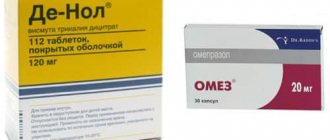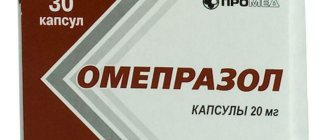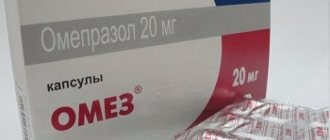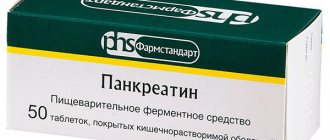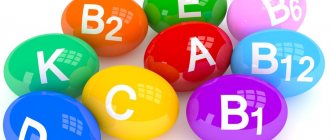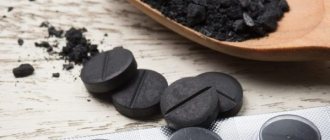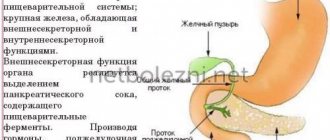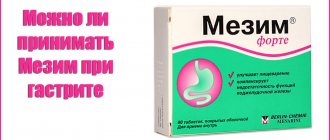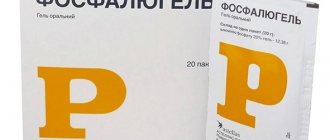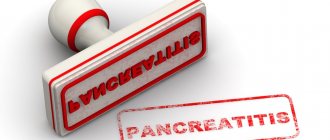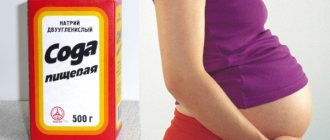How they affect the body
De-Nol suppresses the proliferation of Helicobacter pylori, which is the main cause of gastritis and stomach ulcers. The active substance is bismuth dicitrate, which has the following effects:
- When taken orally, the drug forms a protective film on the surfaces of damaged areas of the gastric mucosa.
- Accelerates wound healing. The active substance reduces the sensitivity of tissues to hydrochloric acid and digestive enzymes, suppresses the action of pepsinogen and pepsin.
- Protects the stomach from the negative effects of anti-inflammatory and cytostatic drugs, alcohol and toxins.
Phosphalugel contains aluminum phosphate, which has the following properties:
- Neutralizes hydrochloric acid, envelops the walls of the stomach. After entering the digestive system, the substance reacts with gastric juice. The acidity level decreases to a normal value, and no re-emission of acid is observed.
- Forms a protective film. The mucous membranes are covered with a layer of active substance, which reduces sensitivity to hydrochloric acid and digestive enzymes.
- Aluminum phosphate binds toxins, removing them with feces.
The principle of action of Phosphalugel and De Nol is based on the ability of medications to neutralize the acid contained in gastric juice; they do not affect the level of secretion. For stomach diseases, drugs have a reparative and protective effect. Regular use of drugs in this group helps to increase the tone of the esophageal sphincter, so they are included in therapy for GER.
Stimulation of a number of protective components of the gastric mucosa (secretion of mucus and bicarbonates, cell regeneration and normalization of blood circulation) occurs due to the ability of antacids to act locally, not penetrate the mucous membrane and release prostaglandins.
What is the beneficial effect of combined treatment with these drugs?
Simultaneous treatment with the described medications speeds up the healing process, reduces pain and heartburn. In this case, it is necessary to correctly distribute the use of funds throughout the day. Active substances De-Nol and Phosphalugel:
- envelop the intestinal walls;
- reduce symptoms of the disease;
- exhibit anti-inflammatory properties;
- do not alkalize gastric juice;
- form a protective film on ulcerative formations and erosions;
- make the gastric mucosa more resistant to the action of hydrochloric acid and gastric juice;
- remove toxic substances and gases;
- increase mucus synthesis.
Both drugs exhibit good compatibility, protect the gastric mucosa, and act locally without penetrating into the systemic bloodstream. De-Nol is a representative of gastroprotectors in the form of tablets, Phosphalugel is an antacid.
Using the drug "Phosphalugel" separately from other drugs
Also, half an hour before meals you should take antacids (ALMAGEL, PHOSPHALOGEL, etc.) and choleretic drugs. Immediately after eating, they take mainly medications that irritate the mucous membrane of the stomach and intestines. If there is a high level of acidity and severe pain in the stomach, it is necessary to use acid-reducing drugs and antacids (for example, Phosphalugel).
The treatment plan and further observation for chronic gastritis largely depends on its cause and type (non-atrophic or atrophic). A common mistake made by patients is long-term self-medication of gastritis symptoms with drugs from the group of proton pump inhibitors, which reduce the secretion of hydrochloric acid in the stomach.
It is important to remember that if you have pain in the stomach, it is strictly forbidden to take painkillers from the group of non-steroidal anti-inflammatory drugs! However, it decreases significantly with a shorter duration of therapy, arbitrary reductions in standard doses, and irregular drug intake.
Despite a long period of active study, peptic ulcer of the stomach and duodenum continues to remain one of the important problems of modern medicine. Phosphalugel belongs to the group of antacid drugs.
The drug is used in combination with other drugs or as monotherapy. The drug Phosphalugel can be used in its pure form or diluted in water before use. For peptic ulcers, Phosphalugel is taken 1–2 hours after meals, as well as when pain occurs. Described methods of diagnosis, treatment, traditional medicine recipes, etc. Half an hour before meals you should take anti-ulcer drugs #8212; DE-NOL, GASTROPHARM.
Gastric acid preparations or digestive enzymes should be taken with food, as they help the stomach digest food. These include PEPSIN, FESTAL, DIGESTAL, ENZISTAL, PANZINORM. Example: ASPIRIN or ASCOPHEN (aspirin with caffeine) is taken after meals, when the stomach has already begun to produce hydrochloric acid.
Medicines taken on an empty stomach are absorbed and absorbed much faster. ASPIRIN (acetylsalicylic acid) breaks down into salicylic and acetic acids. The acidic environment of the stomach can neutralize antibiotics such as erythromycin and ampicillin, cardiac glycosides. The preparations LILY OF THE LILY and STROPHANTA are very sensitive to food juices: taken with food, they are digested along with it.
NISTATIN and POLYMYXIN form the same sediments with bile. It is better to take the medicine with plain boiled water. Tea and juices #8212; not the best remedy. They collect toxins “on themselves” and remove them through the intestines. PHARMACISTS WARN AND ADVISE Emergency medicines are taken regardless of the time of day #8212; if the temperature rises or colic begins.
IF THE INSTRUCTIONS ARE NOT PROVIDED If there are no instructions in the package insert, the medicine should be taken 30 minutes before meals. This applies to the bulk of drugs. You cannot take the drug at a double dose just because you missed the dosage time, #8212; this may increase the side effects of the medicine. Judging by the reviews, it is also used in the treatment of mixed type IBS, the main cause of which is chronic gastritis and gastroduodenitis.
Among them, the most famous are: smecta, almagel, phosphalugel and many others. But the formation mechanism and properties of the resulting film are fundamentally different. 1. The protective film is formed only in an acidic environment, unlike other drugs, i.e. where it is exactly needed. 2. The high effectiveness of de-nol lies in its dual action: it eliminates gastritis and ulcers with a doublet.
It is recommended to take Phosphalugel two hours before or after using other medications. Antibiotics are usually taken regardless of food, but fermented milk products must also be present in your diet. These drugs can cause the development of stomach and duodenal ulcers, which are often accompanied by dangerous complications.
The drug is classified as an astringent medicine. Bismuth subcitrate forms the basis for the treatment of diseases of the digestive tract. "De-nol" creates a protective film against hydrochloric acid and other aggressive factors. It is produced in tablets that are taken orally. In cases of exacerbation of gastritis and ulcers, the product exhibits a high level of effectiveness.
The drug has proven itself in the fight against bacteria directly associated with peptic ulcers and gastritis (H. pylori). It can also have a detrimental effect on other pathogens:
- Yersinia;
- rotoviruses;
- clostridia;
- E. coli;
- Shigella
The drug creates a certain barrier not only against bacteria, but also protection against the penetration of toxic substances. They can enter the body from the outside in the form of medications (cytostatic substances and non-steroidal anti-inflammatory drugs), alcoholic beverages.
The drug is available in the form of a gel. The main active ingredients in the fight against the inflammatory process of the digestive tract are:
- agar-agar;
- aluminum phosphate;
- sorbitol;
- pectin.
Thanks to its adsorbing and enveloping properties, the drug protects the mucous membrane from the aggressive effects of hydrochloric acid. Chronic gastritis "De-nol", "Phosphalugel" is treated according to a certain scheme depending on the age and severity of the condition.
The drug has the property of reducing the effect of pepsin and binding bile acids. "Phosphalugel" is highly effective for irritable bowel syndrome and functional dyspepsia. The adsorbing properties of the drug allow you to get rid of harmful microorganisms that cause fermentation processes in the digestive tract.
The drug should be taken pure or diluted with water at room temperature. Adults and children are advised to take several sachets of the drug during the day, depending on the severity of the condition.
In case of ulcerative lesions of the mucous membrane of the stomach and intestines, a sachet of medicine must be taken an hour after meals. For functional disorders of the gastrointestinal tract, Phosphalugel is taken in the morning, afternoon and evening.
Medicines do not affect concentration in any way, so you can drive a car and other vehicles during the period of treatment with drugs.
The medications do not cause side effects that affect the ability to control complex mechanisms.
Compatibility of Trimedat with certain drugs
Treatment of pathologies of the digestive system involves an integrated approach. Usually, medications from several pharmacological groups are prescribed together. Most often, trimebutine can be used with medications, which include:
- Proton pump inhibitors (Omeprazole, Nolpaza).
- Peristalsis stimulants (Ganaton).
- Antacids (Phosphalugel).
- Choleretic agents (Odeston).
- Products with bismuth (De-Nol).
In order to avoid changes in the pharmacological action of medications when used together, it is important to follow certain rules.
Is it possible to take Trimedat and Omez (Omeprazole) together?
Omez or Omeprazole belongs to the pharmacological group of proton pump inhibitors. The compound reduces stomach acidity by suppressing the activity of the glands responsible for the production of hydrochloric acid.
Against the background of a decrease in acidity, a change in the bioavailability of other drugs cannot be ruled out. When taken in combination, the rate and volume of absorption of trimebutine may decrease. Therefore, if it is necessary to use medications together, it is recommended to first take trimebutine, and after 1 hour Omeprazole or its structural analogues.
Ganaton
The medication is a stimulant of intestinal motility. The application increases the speed and amplitude of wave-like movements of the walls of hollow structures aimed at pushing the contents into the lower sections. This leads to a decrease in nausea, cessation of vomiting, acceleration of food passage in various diseases and functional disorders of the digestive system.
Simultaneous use is possible only in conditions accompanied by a pronounced decrease in the tone of the walls of hollow structures. The combination is prescribed by the doctor. The period of time between taking medications should be at least half an hour.
Simultaneous treatment with Trimedat and Nolpaza
Nolpaza is a proton pump inhibitor. Due to a decrease in the functional activity of the parietal glands of the stomach walls, the production of hydrochloric acid is reduced. In this case, the activity of some digestive enzymes may change, which leads to a decrease in the bioavailability (rate and volume) of the active substances.
Since deterioration in the absorption of trimebutine cannot be ruled out, it is recommended to take it before Nolpaza. In this case, the time period between doses should be at least one hour.
Phosphalugel
Phosphalugel is a representative of the pharmacological group of antacids. It contains components that neutralize hydrochloric acid, thereby reducing acidity. After the neutralization reaction, salts are formed that are not absorbed into the blood and are excreted in the feces. It differs from other antacids in that it has the ability to bind and remove low molecular weight organic compounds from the gastrointestinal tract (properties of an intestinal sorbent). These include various toxins and active components of other medications.
Avoid taking Phosphalugel and Trimedat at the same time, as there may be a deterioration in absorption and binding of the active substance. Trimebutine can be taken only 1 hour before Phosphalugel.
Joint use of Trimedat and Odeston
Odeston, in accordance with the pharmacological classification, belongs to choleretic drugs. It enhances peristalsis of the walls of the hollow structures of the hepatobiliary tract. This leads to an acceleration of the release of bile from the gallbladder into the duodenum. The active component may have an indirect effect on the tone of the smooth muscles of other hollow structures of the digestive tract. It usually consists of a slight increase in peristalsis.
Which is better - De-Nol or Phosphalugel
It is difficult to determine which remedy is more effective. The drugs have different mechanisms of action. They are not analogues, so they cannot replace each other. The drug heals defects, preventing the spread of Helicobacter pylori infection. Phosphalugel is used to eliminate heartburn, sour belching or heaviness in the stomach. It is also effective in cases of poisoning from alcoholic beverages or poor-quality food.
In case of exacerbation of ulcerative processes, De-Nol is considered more effective.
Medicines belong to different pharmacological groups and act on the body differently due to the individual characteristics of the patient’s body. Both drugs protect the stomach and duodenum. The active components of the drugs act on the functions of digestive enzymes, accelerating the breakdown of proteins and fats. There is no clear answer to the question of which medicine is better. The simultaneous use of an antacid and a gastroprotector is possible.
Cost comparison
Thus, the manufacturers provide very simple instructions for the drugs “Almagel” and “Phosphalugel”. The price (analogues are relatively inexpensive) also does not differ too much. "Almagel" costs a little less than the drug "Phosphalugel". A package of the latter (20 sachets) is available in pharmacies. depending on the region, about 350-400 rubles. A 170 ml bottle of Almagel suspension costs patients only about 180-200 rubles. For 20 sachets of the drug “Almagel Neo” or “Almagel A”, pharmacies usually ask for 300-350 rubles.
Reviews about the drug
Phosphalugel is a drug that belongs to the group of antacids. This stomach gel binds hydrochloric acid in the organ and reduces the increased acidity of gastric juice, which is a common symptom of gastritis and ulcers. The effect of the drug also helps to coat the gastric mucosa, creating reliable protection for it from the negative effects of digestive juice. The presence of antacid and protective properties of Phosphalugel contributed to the fact that it began to be actively prescribed for various types of food poisoning.
Effect of the drug
Phosphalugel is a drug that is actively prescribed for the treatment of gastritis. This widespread use is due to the effect that the medication has:
- Antacid. It occurs when hydrochloric acid combines with aluminum phosphate, resulting in neutralization of the former. Thanks to this effect, it is possible to reduce acidity and eliminate heartburn within 10 minutes after taking the medicine. Then the neutralization process is inhibited, and part of the active components of the medication is consumed to maintain a normal level of acidity in the stomach for a long time.
- Enveloping. The drug has this effect thanks to aluminum phosphate colloid. The gel-like substance is adsorbed on the gastric mucosa, forming a mucoid layer. It will become a reliable protection for the mucous membrane, so that toxic substances and toxins will not negatively affect it. The protective property of Phosphalugel allows it to be used for disorders and poisoning.
- Adsorbent. This property is capable of binding pathogenic agents and absorption of gases in the intestinal lumen that will result from fermentation.
The use of this medicine may cause the development of unpleasant symptoms such as nausea and distortion of taste. And although Phosphalugel is a very safe drug, its long-term use can provoke an imbalance in the mineral balance, which will lead to pathologies such as impaired kidney function and impaired musculoskeletal system. When using Phosphalugel in increased dosages, intestinal motility is weakened. Laxatives are used for therapy.
Indications
Phosphalugel has the following indications for use:
- acute gastritis;
- chronic gastritis with increased and normal secretory function of the stomach;
- acute duodenitis;
- peptic ulcer of the stomach and duodenum;
- symptomatic ulcers of various origins;
- erosion of the gastrointestinal mucosa;
- reflux esophagia;
- gastralgia, heartburn;
- gastrointestinal disorders, dyspepsia of neurotic origin.
Contraindications
Phosphalugel should not be used in the following cases:
- Hypersensitivity,
- chronic renal failure,
- pregnancy,
- lactation period,
- Alzheimer's disease,
- hypophosphatemia.
How to take Phosphalugel? It is taken orally in pure or diluted form. It is worth diluting 1-2 sachets of gel with ½ glass of water. Take 2-3 times a day. If you need to eliminate heartburn, then use the drug in an amount of 3-5 sachets.
Treatment of peptic ulcers should be carried out 2-3 hours after eating. The dose is taken at night or at the time of pain. How long to take Phosphalugel? The duration of therapy will be 15-30 days. You can continue taking the drug only if they appear again between doses. Children should take Phosphalugel 10 ml if the baby is under 6 months old. But after 6 months, take ½ sachet.
Phosphalugel can be taken during pregnancy only if the attending physician allows it. Only he will be able to prescribe the dosage and determine the duration of therapy. It depends on the severity of symptoms and the timing of pregnancy. A woman who is carrying a child is prescribed the drug in the amount of 1 sachet 3 times a day.
Phosphalugel instructions for use must be followed completely. As for compatibility with other drugs, the absorption of digoxin, indomethacin, salicylates, chlorpromazine, phenytoin, H2-histamine receptor blockers, beta-blockers, diflunisal, isoniazid, tetracycline antibiotics and quinolones, azithromycin, cefpodoxime, pivampicillin, rifampicin, indirect anticoagulants, barbiturates. These medications should be used only 1-2 hours after taking the gel.
De Nol (international name in Latin De-Nol) is an effective antibacterial drug, the main active ingredient of which is tripotassium bismuth dicitrate. Release form: oval tablets coated with a quick-dissolving coating. The main producing country is the Netherlands.
Let's take a closer look at how to take this medicine, what it helps with, and also find out the predominant properties of the drug. So, the indications for use of De-Nol are quite varied - it has proven itself well for ulcers, gastritis, pancreatitis, as a remedy for heartburn with low stomach acidity, for cholecystitis, for colitis, as well as for the treatment of a number of other ailments.
Many patients receiving treatment, the regimen of which includes the listed medications, leave positive feedback about De-nol (De nol) and Phosphalugel. They have long proven themselves in the fight against inflammatory diseases of the digestive system. The drugs are prescribed by a gastroenterologist, and many patients who take them together according to the regimen already notice an improvement in their well-being in the near future.
Medicines have several structural analogues and generics. Synonyms of Phosphalugel:
- Maalox. It has several forms of release: chewable tablets, suspension (sachets and bottles). The active ingredient is algeldrate in different concentrations; the manufacturer provides for the presence of auxiliary components (sorbitol, sucrose, purified water, flavorings). The drug is taken 3-4 times a day after meals. Cost - from 25 rubles.
- Almagel. Available in the form of a suspension, each package contains a measuring spoon. The main components are alhydrate, benzocaine and magnesium hydroxide. The suspension smells like lemon. The drug is taken 35-40 minutes before eating 3-4 times a day. Price - from 230 rub.
Analogues of De Nola:
- Gaviscon. Available in the form of lozenges and suspensions. The antacid contains sodium alginate, calcium carbonate, sodium bicarbonate. Auxiliary components include flavorings, aspartame, mannitol. The suspension eliminates heartburn; the tablets are taken before meals. There are age restrictions (up to 12 years). Cost - from 145 rubles.
- Gastrocepin. Available in the form of tablets and solution for intramuscular and intravenous administration, which contain pirenzepine. The tablets are washed down with water and taken half an hour before meals. The injection solution is administered twice a day (in the morning and before bedtime). In the absence of the desired effect, the therapeutic rate can be increased with the permission of the doctor. Price - from 315 rub.
- Novobismol. The gastroprotector is available in tablet form and has several active components (bismuth, sodium alginate). Has an astringent and anti-inflammatory effect. Tablets are taken twice a day, 2 pieces at a time. Dispensed by prescription. Cost - from 330 rubles.
Independent selection of substitutes is prohibited. All medications have contraindications, the presence of which makes taking the medication impossible.
Reviews about the drugs are in most cases positive.
Svetlana Makeeva, 28 years old, Magnitogorsk
Phosphalugel was prescribed after diagnosing reflux gastritis. Against the background of constantly increased acidity, I suffered from heartburn and sour belching, and often felt unwell at night. The gastroenterologist advised me to take a course of Phosphalugel; I purchased the drug at a pharmacy without a prescription. Before use, I carefully read the instructions.
I drank the suspension three times a day. The emulsion goes on sale in convenient packages, inside of which there is a single dose. This is convenient; you don’t have to cancel the required norm every time. Side effects occurred on the first day - minor attacks of nausea and defecation problems appeared. She did not take any medications, the ailments went away on their own.
Vladimir Mayorov, 43 years old, Rostov-on-Don
De Nol learned about the drug 2 years ago. Heartburn and burning sensation appeared in the esophagus. After eating, heaviness in the stomach and cramps appeared. The doctor recommended taking an antacid. The condition improved on the 3rd day - the burning sensation became less pronounced, the bitter taste in the mouth disappeared. There were no side effects that bothered me, except for short-term bouts of nausea in the morning. I take Phosphalugel regularly several times a month for heartburn and as a prophylactic against gastritis.
The following medications have a similar effect:
- Novobismol;
- Vikalin;
- Gastrofarm;
- Gaviscon;
- Omez-D;
- Vikair.
Ekaterina, 35 years old, therapist, Naberezhnye Chelny: “Phosphalugel and De-Nol are effective drugs used to treat gastritis and ulcers. Active substances protect the gastric mucosa from the effects of aggressive factors and promote the healing of erosive defects. When exposed to an acidic environment, the drug forms insoluble compounds that form a protective film. During treatment, nausea, a feeling of heaviness in the stomach, and constipation may occur. Unpleasant symptoms disappear after stopping the drugs.”
Vera, 55 years old, St. Petersburg: “The gastroenterologist prescribed Phosphalugel and De-Nol during the acute period of a stomach ulcer. After the first dose, the abdominal pain became less pronounced, and heartburn and belching stopped appearing at night. The examination showed that the ulcerative defects had healed. Signs of the disease have not appeared for 5 years.”
Patients' opinions about the drug "Omez"
This analogue of “Phosphalugel”, produced in the form of a suspension (in capsules), as many patients believe, simply perfectly eliminates stomach pain. In addition, it is well tolerated by the body. Omez almost never causes side effects. Patients have different reviews regarding the price of this medicine. The fact is that Omez capsules are supplied to the market from two different manufacturers. The domestic drug costs several times less than the imported one. Moreover, the main active ingredient in it is exactly the same.
Indications for prescribing the drug "Phosphalugel"
Both drugs are prescribed for the following diseases of the gastrointestinal tract:
- exacerbation of peptic ulcer of the stomach and duodenum;
- chronic gastroduodenitis;
- dyspeptic disorders;
- irritable bowel syndrome combined with stool disorders;
- gastritis with high acidity;
- chronic pancreatitis;
- reflux disease;
- diaphragmatic hernia;
- poisoning.
Taking medications is contraindicated in the following pathological and physiological conditions:
- hypersensitivity to drug ingredients;
- severe liver and kidney diseases;
- allergic reactions to phosphates;
- Alzheimer's disease.
Limitations to therapy include liver cirrhosis and heart disease.
There are a certain number of indications for prescribing the drug for damage to the digestive tract. These include:
- ulcers of the stomach and intestinal mucosa;
- gastritis in exacerbation with varying acidity;
- heartburn;
- dyspeptic condition;
- dyspepsia not associated with ulcers;
- reflux gastritis;
- functional lesions of the digestive tract.
The course of treatment is individual for each patient. It is allowed to combine De-Nol and Phosphalugel (the drugs and regimen are determined depending on the indications and the degree of damage to the digestive tract).
The range of indications for the use of the drug is very similar to when it is necessary to use De-nol. Therefore, they can be combined in a scheme for such pathologies as:
- peptic ulcer;
- diaphragmatic hernia;
- dyspepsia of various origins;
- reflux esophagitis;
- diarrhea not related to ulcerative disease of the digestive tract.
Before starting treatment, you need to read the instructions to know how to take De-nol with Phosphalugel. The dosage and frequency of administration are determined depending on the indications and severity of the patient’s condition.
There are certain conditions when it is temporarily or not at all recommended to be treated with the medications “De-Nol” and “Phosphalugel”, both in monotherapy and in combination. These include the following conditions:
- chronic renal failure, occurring in severe severity;
- intolerance to certain substances that form the basis of the drug or are among the additional ones;
- diabetes.
The listed conditions are not always an absolute limitation for taking medications. To clarify this issue, consultation with a specialist is necessary.
The main indications for use are specified in the instructions for use. These include:
- chronic diseases of the stomach (pancreatitis, gastritis, the presence of ulcerative processes on the mucous membrane);
- diaphragmatic hernia;
- diarrhea (functional);
- reflux esophagitis;
- pathologies of the large intestine;
- heartburn;
- non-ulcer dyspepsia.
Medicines can be taken for stomach and intestinal disorders caused by poisoning and accompanied by vomiting, diarrhea and nausea.
Phosphalugel has virtually no contraindications, with the exception of individual intolerance to some components. De Nol is prohibited from being prescribed to people suffering from kidney and liver failure and to children under 12 years of age. Pregnancy, lactation, liver cirrhosis, heart failure are considered relative contraindications.
Instructions for use
The package should be kneaded without opening so that the contents become homogeneous. Then carefully cut off the corner along the dotted line. Dissolve the gel in water, or use it in its pure form (taken orally).
Regimen for taking Phosphalugel for gastritis in adults and children over six years of age: each time before meals, take a sachet (20 g) two to three times a day. Individual dosage is prescribed depending on the severity of the disease. If pain reappears between doses of the drug, it is permissible to take it again.
If a woman has not previously experienced heartburn, pyrolysis can manifest itself clearly during pregnancy. The phenomenon is associated with an increase in progesterone in the blood of pregnant women, causing considerable discomfort to the expectant mother, and the woman begins to look for treatment. Let's figure out to what extent Phosphalugel is suitable.
It is known that in the first months of pregnancy, the formation of the baby’s organ systems occurs. In the initial period, you want to avoid serious effects of drugs on the mother’s body. Uncontrolled use of Phosphalugel, like any other drug, can have an extremely negative impact on the child’s health.
During pregnancy, you are allowed to drink Phosphalugel only after consulting with your doctor. The doctor will prescribe a separate dosage and determine the required treatment time. In some cases, pregnant women are prescribed to take the drug one sachet up to three times a day, depending on the personal condition and symptoms present.
Using the drug "Phosphalugel" separately from other drugs
The drugs are compatible with each other. They can be taken as part of complex therapy for exacerbation of chronic pathologies of the intestines and stomach.
Tetracycline antibiotics, medications containing iron and cardiac glycosides must be taken 2 hours after taking the gastroprotector and antacid. Phosphalugel may affect the rate of absorption of certain drugs (tetracyclines). The gastroprotector can be combined with other antacids. At least 2-2.5 hours should pass between doses of different categories of medications.
Alcoholic drinks have a destructive effect on the mucous membranes of the stomach and intestines, so experts recommend stopping drinking alcohol before starting treatment for diseases of the digestive system. Both medications should not be combined with alcohol.
The cost of medicines varies depending on the point of sale. The price of Phosphalugel is from 170 rubles, De Nola – from 350 rubles. If medications are ordered online, the price may include the cost of courier delivery.
The medications are compatible, so they can be part of complex treatment regimens for stomach diseases.
Medicines are not recommended to be taken in combination with antacids, antibiotics, or non-steroidal anti-inflammatory drugs. Breaks between uses should be at least 2 hours.
Medicines are incompatible with ethyl alcohol, so during therapy you should refrain from drinking alcohol.
The average price of De-Nol is 350 rubles. A package of Phosphalugel will cost 170 rubles.
Simultaneous dosage regimen
To restore the normal anatomical structure and functioning of the stomach and duodenum, you should not take De Nol and Fofalugel at the same time. The time interval must be observed not only between taking these two drugs, but also taking into account food intake.
An approximate scheme for the simultaneous treatment of gastritis, duodenitis and peptic ulcer:
- At least half an hour before meals, take the dose of De Nol selected by your attending physician. During this time, drinking water, juices and other drinks is also prohibited.
- After eating, you should wait at least 2 hours and only after that take Phosphalugel in the dosage prescribed by the doctor.
During the treatment of pathology, it is imperative to ensure that the interval between doses of these drugs is at least two hours.
In cases of concomitant pathology of the heart, blood system, as well as when treating with drugs of the tetracycline group, the same time interval should be maintained between doses of De Nol, Phosphalugel and drugs prescribed by a doctor for the treatment of other diseases.
It should also be borne in mind that in the process of treating pathologies of the gastrointestinal tract, a protective film is created on the mucous membranes of the stomach and duodenum; the therapeutic effect of drugs used to treat concomitant pathologies may decrease.
How to take De-Nol and Phosphalugel together
De-Nol take 1 tablet 30 minutes before meals and before bedtime. Can be used in 2 pcs. 2 times a day. Dosages for children are set at the rate of 8 mg/kg. The effectiveness of the drug is reduced by fermented milk products, juices and sour fruits.
Before use, the contents of the sachet are dissolved in warm water. For gastritis, the medicine is taken before meals, for ulcers - after meals. To get rid of heartburn, Phosphalugel is used immediately after the appearance of an unpleasant symptom. Children under 6 years old are given half a sachet. The course of treatment lasts 2 weeks.
Phosphalugel is used 1-2 sachets 2-3 times a day.
When taking these medications together, an interval must be observed. The combination of an antacid and a gastroprotector helps restore the normal functioning of the digestive organs. De Nol is available in tablets that must be taken daily, 1 tablet 3 times a day 30 minutes before meals. The daily dose should not exceed 4 tablets.
Phosphalugel in the form of a gel is taken orally 120 minutes before the intended meal. It can be taken in pure form or dissolve the contents of the package (16-20 g) in 100 ml of warm water. The daily norm is no more than 5-6 packets.
Composition and release form
For gastritis, Phosphalugel is prescribed when the acidity of gastric juice increases.
The drug is offered in only one format - as a gel for oral administration. The medicine is offered in foil sachets of 20 and 16 grams, which makes it easier to take Phosphalugel for gastritis: there is no need to calculate the dosage. One package can contain 20/26 sachets. There is no tablet form of the drug. The gel has a white color and a characteristic orange taste and aroma.
The active ingredient of the drug is aluminum phosphate. It is this substance that is most often used to create drugs with antacid properties. The following are used as auxiliary components:
- sorbitol;
- pectin;
- agar-agar;
- orange flavor and others.
Since the antacid does not contain sugar, it is allowed to be used for any form of diabetes.
Registration number: P N012655/01
Trade name: PHOSPHALOGEL
International nonproprietary name or generic name: aluminum phosphate
Dosage form: gel for oral administration
| Gel for oral administration (16 g sachets) | 1 pack |
| aluminum phosphate | 10.4 g |
| sorbitol 70% | 4.48 g |
| agar-agar | 0.0448 g |
| pectin | 0.0872 g |
| calcium sulfate | 0.0117 g |
| potassium sorbate | 0.0402 g |
| orange flavor | 0.08 g |
| purified water | up to 16 g |
in a box 20 or 26 pcs.
| Gel for oral administration (20 g sachets) | 1 pack |
| aluminum phosphate | 12.38 g |
| sorbitol 70% | 4.2857 g |
| agar-agar | 0.08 g |
| pectin | 0.1 g |
| calcium sulfate | 0.01 g |
| potassium sorbate | 0.0530 g |
| orange flavor | 0.032 g |
| purified water | up to 20 g |
White or almost white homogeneous gel, sweet taste, with the taste and smell of orange.
special instructions
If constipation occurs during medication treatment, experts recommend drinking large amounts of water. In elderly patients and children, an increase in the concentration of aluminum in the blood is possible. De Nola tablets should be taken with warm water, without using other drinks for this purpose.
Patients with diabetes can take medications without first adjusting the dosage regimen. It is not necessary to stop taking medications before an abdominal x-ray. During the treatment period, it is recommended to avoid consuming fermented milk products and drinks.
For pregnant and breastfeeding women, medications are prescribed by a doctor. The specialist determines the dosage regimen and period of use.
Childhood
Children under 12 years of age are contraindicated in taking the medicine. For adolescents, treatment should begin with half doses, gradually increasing the daily dose.
Elderly age
Elderly patients are recommended to use medications under the supervision of a specialist. Patients in this category may need to adjust the dosage regimen downward.
According to the instructions for use of medications, Phosphalugel and De-Nol should be taken with caution in certain conditions.
Statistics and facts
Phosphalugel (trade name) is a modern, effective drug intended for the treatment of acid-related diseases of the digestive system. The main mechanism of action of antacids is associated with the effect on hydrochloric acid of the stomach and its neutralization.
Produced by Japanese Pharmaceutical. The manufacturer also supplies the market with drugs for the treatment of urological, immunological, dermatological, cardiological, infectious diseases, as well as drugs used in transplantology.
One of the indications for the use of antacids is gastritis. Gastritis is an inflammatory process of varying severity in the gastric mucosa, accompanied by a violation of its basic functions. It can be asymptomatic, or it can manifest itself clearly. In this case, the prescription of symptomatic therapy is indispensable.
- Contamination with Helicobacter pylori.
- Errors in nutrition and daily routine: long breaks between meals, consumption of fatty, fried, salty foods, smoked foods.
- Smoking.
- Taking nonsteroidal anti-inflammatory drugs: If necessary, you should always use additional medications that protect the gastric mucosa.
- Gastrointestinal parasites.
- Stress: by affecting the sympathetic nervous system.
- Genetic predisposition.
- Autoimmune processes in the body.
For gastritis, etiotropic therapy aimed at the cause is necessarily prescribed (for example, antibacterial therapy for Helicobacter pylori contamination), and, for example, antacids are effective in relieving symptoms that impair the quality of life.
Side effects
Medicines have a wide range of indications for gastrointestinal pathology in the acute phase. Like any other drug, they can cause side effects. These include:
- allergic reaction due to intolerance to certain components;
- “Phosphalugel” can provoke constipation, and “De-nol” can cause diarrhea;
- nausea or vomiting.
Due to the listed conditions, you cannot take the medication yourself. It is first necessary to consult a specialist and collect the necessary information that will prevent the development of the listed conditions. To avoid the development of complications, you should first read the instructions, which indicate how to take “Phosphalugel” and “Omeprazole” for gastritis, ulcers and other pathologies.
Side effects when taken in combination are transient and do not cause significant harm to the patient’s body. These include:
- vomiting;
- attacks of nausea;
- stool disorders;
- pain in the epigastric region;
- intestinal dysbiosis.
In hypersensitive patients, the risk of developing allergic reactions increases. Patients experience hyperemia, itching and burning of the skin, lacrimation and sneezing attacks. Encephalopathy, which occurs as a result of an increase in the concentration of bismuth in the central nervous system, is classified as a side effect.
De-Nol sometimes causes allergic reactions in the form of skin rashes and itching, digestive disorders (nausea and vomiting, slowing or accelerating intestinal motility).
When using medications, darkening of the stool may occur.
The cheapest analogs of Phosphalugel
The drug has a fairly large number of analogues in terms of the effect it has on the body; the cheapest include Alyugastrin, Gastracid, Omez, Gaviscon, Gastrofarm, Smecta, Gastal.
Alugastrin
Alugastrin is an antacid with an astringent and enveloping effect. Alugastrin is based on dihydroxyaluminum sodium carbonate.
The drug normalizes the acidity of the gastric environment by neutralizing HCI. The drug is sold in the form of an oral suspension placed in 250 ml bottles.
Alyugastrin is prescribed for ulcers and gastritis, caused by increased acidity of gastric secretions. It is prohibited to take the medication if you are allergic to its composition or have severe kidney dysfunction.
The suspension must be taken between meals. Recommended dose – 1-2 tsp. suspensions. The drug can be taken either in its pure form or mixed with a small amount of warm water (about a quarter glass).
Alyugastrin, as a rule, is well tolerated by the body and rarely causes any complications. Possible side effects of the drug include a slight feeling of nausea with the urge to vomit.
Alyugastrin differs from the “main” medication in the active component and, as a result, in the scope of application, since Alyugastrin is prescribed exclusively for the treatment of ulcers and gastritis (hyperacid).
Gastracid
Gastracid is a combined medication representing a group of antacids with an adsorbent and enveloping effect.
Gastracid normalizes the pH of gastric contents by inactivating hydrochloric acid. Thanks to its adsorbing effect, it helps cleanse the gastrointestinal tract of toxins, and the enveloping effect protects the gastric mucosa from various damaging factors.
Sold in the form of tablets, the active ingredients of which are algedra and Mg(OH)2. Each tablet contains 400 mg of each active ingredient. They must be chewed or placed on the tongue and wait for it to completely dissolve. The average daily dose ranges from 4-8 tablets.
Prescribed for the treatment of gastric and duodenal ulcers, gastritis with suspended and physiologically adequate acidity, diaphragmatic hernia and reflux esophagitis.
Gastracid can be prescribed to prevent adverse reactions during therapy with glucocorticosteroids and NSAIDs. The drug should not be taken if you are allergic to its composition, as well as with P deficiency, kidney dysfunction and Alzheimer's disease.
Gastracid can cause unwanted side effects, including:
- problems with bowel movements;
- nausea with bouts of vomiting;
- abdominal pain;
- changes in taste sensations;
- deficiency of P and Ca;
- excess Mg and Al;
- kidney dysfunction;
- allergic manifestations.
Overdose
The main symptom of overdose is impaired renal function. The pathology is reversible and can be corrected - the kidneys begin to function normally after stopping the medications. When contacting a medical institution, a specialist is obliged to examine the patient, collect an analysis and prescribe symptomatic treatment: gastric lavage, taking enterosorbents and saline solutions.
If there is a sharp increase in bismuth, the patient must be administered chelating agents. Hemodialysis is effective in cases of severe renal impairment.
Long-term use of high doses of drugs leads to the development of acute renal failure. The disease is accompanied by swelling, headaches, insomnia, and a decrease in the volume of urine excreted. Treatment is symptomatic.
When should you not use Phosphalugel to treat gastritis?
The drug "Phosphalugel", the price of which is considered affordable and affordable, has certain contraindications. Due to its low cost, many consumers take this product on their own. You should always remember about possible overdose and contraindications.
- It is strictly forbidden to take the gel if you have Alzheimer's disease, kidney failure or intolerance to the active ingredients.
- Particular care must be taken if you have heart failure or liver cirrhosis.
- Consult a physician before use on children and pregnant women.
- Consuming large portions of the drug can lead to impaired absorption of nutrients and their deficiency. This is often expressed by abdominal discomfort, flatulence, diarrhea, and poor health.
The drug - Phosphalugel was developed by the French pharmaceutical company Pharmatic based on the active substance - aluminum phosphate. Instructions for use contain indications for the treatment of diseases and elimination of pathological processes of the gastrointestinal tract.
Use of the gel during pregnancy and before stopping breastfeeding
Treatment of inflammatory processes of the gastrointestinal tract during pregnancy with Phosphalugel is carried out in exceptional cases. No studies have been conducted on the effect of the drug on the body of a woman carrying a child or on the fetus itself.
Manufacturers of the drug do not provide instructions regarding gel therapy during pregnancy and lactation. In this regard, a specialist can prescribe Phosphalugel only for acute indications. If medication therapy is administered during lactation, feeding is stopped to eliminate any risks.
This medicine can be taken throughout pregnancy, but under the supervision of a doctor. Usually prescribed occasionally - when digestive disorders occur. In this case, the maximum single dosage is 2 packets of 20 g, and the maximum daily dosage is 100 g (5 packets of 20 g).
Phosphalugel can be prescribed to pregnant women to eliminate toxicosis. For this purpose, take 1 packet of 16 g x 3–4 times/day before meals (the first packet can be taken on an empty stomach)
If indicated, the drug Phosphalugel gel can be taken by pregnant women. Aluminum phosphate does not cause developmental abnormalities in the fetus and does not have an embryotoxic effect even when the drug is used in the early stages of pregnancy.
Phosphalugel can be taken orally by nursing mothers; no harm to the infant is observed.
The use of an antacid during pregnancy and breastfeeding is possible. A preliminary consultation with a gynecologist and his constant monitoring during the course of therapy are necessary.
